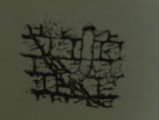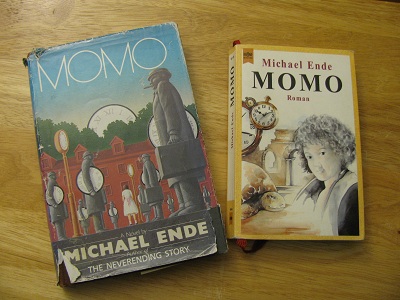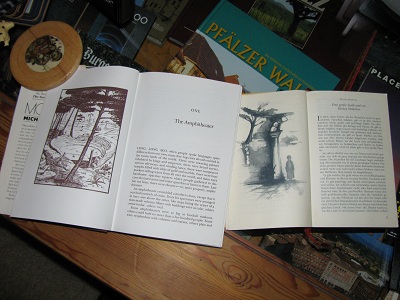It’s time for Sonderling Sunday! That time when I use children’s books to give interesting and enlightening translations of phrases that must be useful — they’re used in a children’s book! This is intended to be interesting even for readers who don’t speak German, but who find words even a little bit fascinating.
I wanted to look at a book originally written in German, and of course the first book I thought of was Momo, by Michael Ende.
Momo was the first book I ever purchased from Book-of-the-Month Club, and worked out so well, I blame it for my subsequent addiction. Momo was, I believe, the first book my husband-to-be and I read aloud to each other. We later read it aloud to our boys. A copy of Momo, in the original language, was my very first purchase when we moved to Germany in 1996, along with a hiking map of the area we moved to. Even if I couldn’t read it yet, I wanted to own it. I can’t quite put Momo above Anne of Green Gables in my list of all-time favorite children’s books, but I consistently call it Number Two.
Besides being a good story, Momo is mythic. Gray men come stealing people’s time. They convince people to save time — and then they steal it. Momo is the only one who can see them, since she has a gift of listening. My then-boyfriend and I were finishing reading this book aloud during Finals Week in college. We knew we “didn’t have time” — but it’s not a book you can use that excuse not to read!
This book is only slightly longer in German than in English, unlike some others. However, my English edition uses much larger print than the German one, so that may be a factor. It is 227 pages in English, translated from 285 pages in German.
I don’t have much time left of Sunday, but let’s see if I can make a start into Chapter One. Part One, Erster Teil is called “Momo and Her Friends” in English, translated from Momo und ihre Freunde. Erstes Kapitel is titled Eine gro?e Stadt und ein kleines Mädchen, which means “a big city and a small girl.” I like that much better than the English chapter title, “The Amphitheater.” Here are the two different chapter title pages:
I love it! I looked at the front matter more carefully than before, and it turns out that the German edition has a subtitle on the title page. The English edition does not. It goes like this:
MOMO
oder
Die seltsame Geschichte von den Zeit-Dieben und von dem Kind, das den Menschen die gestohlene Zeit zurückbrachte
This roughly translates to: “MOMO, or: The Strange Story of the Time Thieves and of the Child Who Got the Stolen Time Back for Mankind”
Now I’ll go to some phrases from the first chapter. This time, since the original language is German, I’ll begin with the German, then tell how it was translated.
breite Stra?en, enge Gassen und winkelige Gä?chen = “broad streets, narrow alleyways, and winding lanes”
goldenen und marmornen Götterstatuen = “idols of gold and marble”
aus Steinblöcken gefügt waren = “built entirely of stone”
Die Sitzreihen für die Zuschauer lagen stufenförmig übereinander wie in einem gewaltigen Trichter. = “Seats for spectators were arranged in tiers, one above the other, like steps lining the crater of a man-made volcano.”
(Longer in English! Google translates gewaltigen Trichter as “mighty funnel,” and the translator’s choice does seem more descriptive.)
With the intricacies of word order, it’s easier to give this complete sentence:
Es gab prächtige, mit Säulen und Figuren verzierte, und solche, die schlicht und schmucklos waren. = “Some were resplendent with columns and statues [Säulen und Figuren], others plain and unadorned [schlicht und schmucklos].”
unter freiem Himmel statt = “open to the sky”
plötzlichen Regenschauern = “sudden downpours”
leidenschaftlicher Zuhörer und Zuschauer = “enthusiastic playgoers” (“passionate hearers and viewers”)
haben die Steine abgeschliffen und ausgehöhlt = “worn away and eaten into the stonework”
I think this sentence is a little more poetic in the original language:
Im geborstenen Gemäuer singen nun die Zikaden ihr eintöniges Lied, das sich anhört, als ob die Erde im Schlaf atmet. = “Crickets now inhabit their crumbling walls, singing a monotonous song that sounds like the earth breathing in its sleep.”
This, too, sounds better in German:
die Hütten und Häuser immer armseliger werden = “the houses became shabbier and more tumbledown” (Google translates it as “the cabins and houses are always poor”)
Pinienwäldchen = “a clump of pine trees”
Altertumswissenschaft = “Archaeology” (“antiquity knowledge craft”)
These are simply fun to say:
grasbewachsenen Sitzreihen = “grass-grown tiers of seats”
knipsten ein Erinnerungsfoto = “took a couple of snapshots” (literally: “snapped a memory-photo”)
man beim besten Willen nicht erkennen konnte, ob sie erst acht oder schon zwölf Jahre alt war. = “no one could have told her age” (literally: “one with the best will couldn’t tell if she was eight or maybe twelve years old”)
einen wilden, pechschwarzen Lockenkopf = “unruly mop of jet-black hair”)
bunten Flicken = “patches of different colors”
reichte ihr bis auf die Fu?knöchel = “ankle-length” (literally: “reached to her foot-knuckle” I like that word for ankle!)
deren Ärmel an den Handgelenken umgekrempelt waren = “with the sleeves turned up at the wrist”
I like this one:
aufgeschnappt = “picked up”
 rostiges Ofenrohr = “rusty stovepipe”
rostiges Ofenrohr = “rusty stovepipe”
(This picture is from the English edition.)
ein ausgedientes, mit Schnörkeln verziertes Eisenbett = “a decrepit iron bedstead adorned with curlicues” (literally: “an unused, with scrolls decorated iron bed”)
steinernen Loch = “stone cell”
Bühne der Ruine = “stage of the ruined amphitheater”
This doesn’t sound like what it is to me:
behagliches kleines Zimmerchen = “snug little room”
einen kleinen Brotwecken = “a hunk of bread”
The last sentence of the first chapter:
So begann die Freundschaft zwischen der kleinen Momo und den Leuten der näheren Umgebung. = “And that was the beginning of her friendship with the people of the neighborhood.”
Now, for a little fun. Can you use any of these phrases in a sentence? How about translating them into some other language? How do you say “ankle” in Chinese, for example? Or “snug little room” in Spanish?
My favorite phrase from tonight’s chapter was knipsten das Erinnerungsfoto, because I did lots and lots of that all over Europe during the ten years we lived in Germany. But I also have a jacket that I wear deren Ärmel an den Handgelenken umgekrempelt waren. Now when I do so, I will think of Momo.

